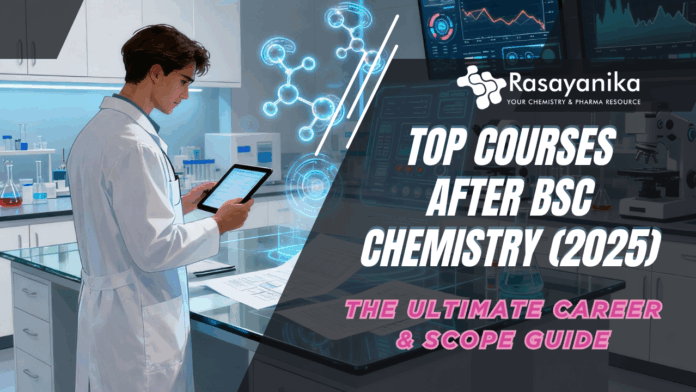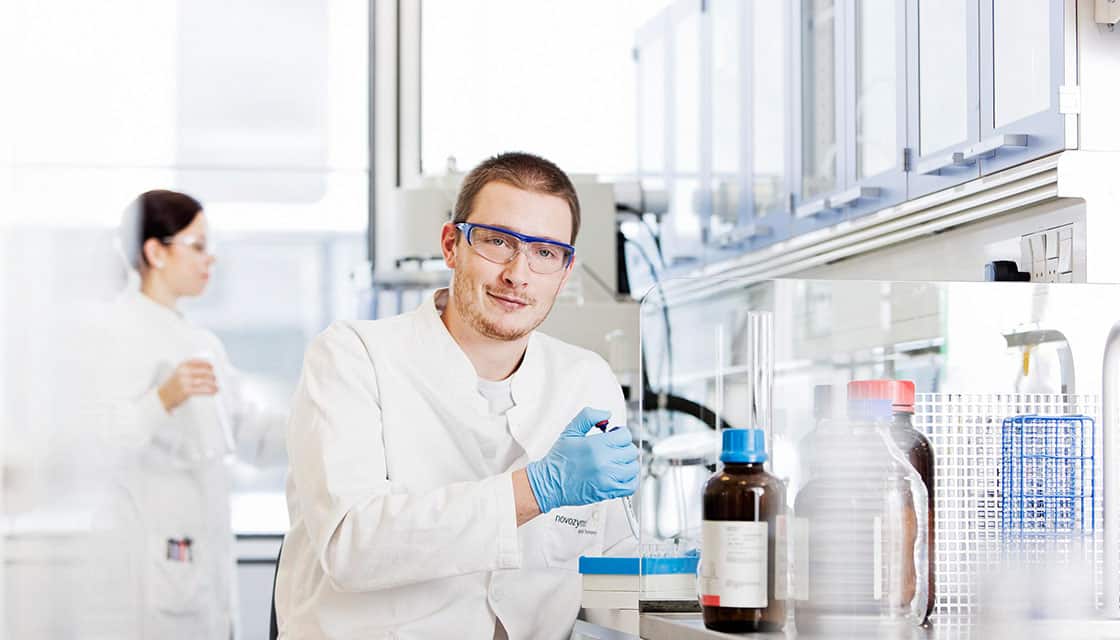
Table of Contents
Top Courses After BSc Chemistry (2025): The Ultimate Career & Scope Guide
Despite having a Bachelor of Science in Chemistry, are you still looking for a job? Beyond your degree, do employers continue to need “extra technical skills”? This platform is where you will find the most popular BSc Chemistry courses following a bachelor’s degree in chemistry that are truly influencing the direction of chemical jobs in 2025. The chemistry world has changed. Chemists are no longer limited to titrations, test tubes, and laboratories. Through computational modeling, data science, and AI-driven research, today’s chemist explores the digital side of molecules. They are part scientists, part programmers, and part data analysts. Chemical data science, computational chemistry, biotechnology, pharmacology, and industrial R&D are among the high-value, fascinating occupations that will be created in 2025 as chemistry combines with digital technology and computerization. In addition to traditional knowledge, these sectors require tech-savvy scientists who can code, analyze large amounts of data, and model reactions before they occur.
Graduates of BSc Chemistry programs must supplement their degrees with advanced postgraduate courses that combine chemistry and technology to remain competitive in the field. Graduates who master programming, AI, machine learning, and analytical software can access employment options that were unthinkable just ten years ago.
To keep you employable, prepared for the future, and at the forefront of innovation in a world where technology and chemistry collide, this article will direct you to bsc chemistry courses the most sought-after postgraduate courses in 2025 after earning a bachelor’s degree in chemistry. This article provides the Top Courses After BSc Chemistry (2025).
What is BSc Chemistry?
A BSc Chemistry is an undergraduate program that students take after their secondary education.
- Duration: Three years (six semesters)
- Eligibility: 12th mathematics/biology, chemistry, physics
- Fees: ₹20,000 to ₹2,00,000 per year
- Post-graduation salary is ₹2 and 5 LPA.
Students experiment with laboratory equipment, thereby becoming familiar with it and learning analytical, physical, organic, and inorganic chemistry. The latest scientific equipment produces humongous data, hence programming and data analysis have become a requirement of research.
Why Pursue a Bachelor’s Degree in Chemistry?
Chemistry is increasingly data-intensive in pharmaceuticals, nanotechnology, sustainability, and R&D. The industry, however, needs postgraduate chemists with the ability to apply data analysis, computational approaches, and automate analysis. Technology and chemistry convergence enhance professional development.
- Selection of Courses in Chemistry After a Bachelor’s Degree
Exposure to all of the wide areas of chemistry, perfect for a research and teaching course.
Master of Science in Chemistry
It is a postgraduate program where students are given access to advanced chemistry knowledge and expertise. Physical, organic, inorganic, medicinal, and analytical chemistry principles are all covered in detail in the MSc Chemistry curriculum. General purpose in organic, inorganic, physical, and analytical.
- Duration: Two years
- Qualifications: Bachelor of Science in Chemistry
- Institutions: DU, Fergusson College, IITs, and IISc
- Career Posts: Analytical Chemist, Research Associate, and Lecturer
- Average Salary: ₹5–10 LPA
A. Master of Science (MSc) in Analytical Chemistry
This specialization focuses on spectroscopy, chromatography, quality assurance, and instrumental analysis—the foundation of pharmaceutical and industrial manufacturing. Among the most stable and lucrative areas in chemistry is this one.
- Career Scope: QC Officer (₹4–8 LPA), Laboratory Analyst, QA Executive, Research Associate
- Industry Demand: Pharma, Chemical Manufacturing, Cosmetics, and Food Testing Labs
B. Master of Science (MSc) in Organic Chemistry
The MSc in Organic Chemistry is perfect for jobs in pharmaceutical research and development, petrochemicals, and material science since it dives deeply into carbon compounds, medication design, and polymer synthesis.
- Career Scope: R&D Chemist (₹5–12 LPA), Process Development Scientist, Synthetic Chemist
- Emerging Fields: Green Chemistry, Polymer Innovation, and AI-Assisted Drug Design
C. Master of Science (MSc) in Biochemistry
This course helps students investigate how chemical reactions take place inside biological systems by bridging the gap between chemistry and life sciences. Careers in molecular biology, biotechnology, and diagnostics require it.
- Career Scope: Biotech Researcher (₹4–8 LPA), Lab Specialist, Biomedical Analyst
- Industry Applications: Pharmaceuticals, Food Technology, Agricultural Biotech, and Clinical Labs
D. Master of Science (MSc) in Environmental Science (Specialization in Climate Science & Sustainability)
Using chemistry to combat climate change is essential. This program teaches students sustainable chemistry, waste management, and pollution monitoring—all of which are critical in the modern green economy.
- Career Scope: Pollution Analyst (₹4–7 LPA), Environmental Consultant, Sustainability Officer
- Work Areas: Government Environmental Departments, NGOs, and Sustainability Startups
E. Master of Science (MSc) in Forensic Science
This course, which combines analytical chemistry, toxicology, and criminal investigation in an entertaining way, is ideal for anybody interested in using science in the legal system.
- Career Scope: Toxicologist (₹4–8 LPA), Forensic Scientist, DNA Analyst
- Recruiters: Police Departments, Crime Labs, and Intelligence Agencies
F. Master of Science (MSc) in Pharmaceutical Chemistry
An industry-focused, in-demand course that emphasizes clinical development, medicinal chemistry, and drug formulation. It gets you ready for one of the most fulfilling jobs in chemistry.
- Career Scope: Pharma Scientist (₹5–9 LPA), Formulation Chemist, Drug Regulatory Associate
- Recruiters: Sun Pharma, Dr. Reddy’s, Cipla, Pfizer, and Biocon
G. Master of Business Administration (MBA) in Industrial or Chemical Management
This course is perfect if you want to oversee large-scale production facilities or manage chemical operations. It prepares you for leadership positions by fusing industrial chemistry with management concepts.
- Career Scope: Head of Production / Plant Manager (₹8–20 LPA), Operations Manager
- Best For: Chemists seeking business leadership or entrepreneurship
H. PG Integrated One-Year Diploma Courses in Clinical Research & Chemical Analysis
Programs that are short-term and skill-based to increase employability quickly. Chemical testing, industrial analysis, and clinical data management are all practically exposed in these courses.
- Career Scope: Clinical Data Coordinator (₹4–7 LPA), Analytical Chemist, Quality Analyst
- Popular Choices: PG Diploma in Clinical Research, Chemical Analytics, or Regulatory Affairs
I. Integrated MSc–PhD Programs
A straight route to bsc chemistry courses to advanced scientific professions for students who are enthusiastic about teaching, research, or innovation is an integrated MSc–PhD. It enables students to specialize early and establish a solid academic foundation and is provided by IITs, IISc, IISERs, and leading research institutes.
- Career Scope: Professor, Scientist, Research Fellow (₹6–12 LPA+)
- Fields of Research: Nanotechnology, Materials Chemistry, Medicinal Chemistry, and Computational Chemistry
J. Emerging Interdisciplinary Courses
By 2026, technology and chemistry will be merging. Students might investigate cutting-edge specializations that complement the digital revolution:
- MSc in Computational Chemistry
- MSc in Cheminformatics
- MSc in AI & Machine Learning for Chemical Research
- PG Diploma in Data Science for Chemistry
- MSc in Materials Informatics
These futuristic courses equip graduates with hybrid skills—chemistry + coding + data science—opening roles in AI-based drug discovery, digital labs, and sustainable innovation.
- Good Paying Salary Jobs after BSc Chemistry
Job Profile: Research Scientist
Recommended course: MSc Chemistry.
Salary range: ₹6–10 LPA
Job Role: QC/QA Analyst
Recommended course: MSc Analytical/Pharmaceutical Chemistry
Salary range: ₹5 to 9 LPA
Job Role: Pharmacist researcher
Recommended course: MSc Organic/Pharmaceutical Chemistry
Salary range: ₹5–12 LPA
Job Role: Environmental Advisor
Recommended course: Master of Science in Environmental Science
Salary range: ₹4–7 LPA
Job Role: Computational chemist
Recommended course: MSc + Certification in Programming/AI
Pay scale range: ₹8–15 LPA
Job Role: Patent Analyst
Course recommended: MSc + Intellectual Property (IP) Law Course.
Pay range: ₹6–10 LPA
Computer programming improves one’s productivity through the assistance of data modeling, automation, and visualization.
- Government Jobs after B.Sc. Chemistry
Government agencies such as IOCL, BARC, ONGC, DRDO, and ISRO recruit chemists for laboratory, analytical, and research jobs.
Exams: UPSC, SSC Scientific Assistant, CSIR-NET, GATE
Pay range: ₹4–9 LPA
Note: The salary package may vary with experience, companies, and skills.
- Private Sector Jobs after B.Sc. Chemistry
Graduates in chemistry are highly sought after in the food processing, paint, oil and gas, pharmaceutical, and environmental services industries. While the oil and gas industry uses chemists to refine, test, and produce sustainable fuels, the pharmaceutical industry offers positions in R&D, quality control, and drug development. Chemists develop novel, environmentally friendly coatings and polymers for the paint industry. Chemists are valued by the food sector because they guarantee the quality, safety, and nutrition of processed foods. Environmental services, meanwhile, employ professionals for waste management, pollution monitoring, and green chemistry projects. In 2025, chemistry will be one of the most flexible professions due to these businesses’ great employment stability, rapid growth, and fulfilling scientific careers.
Industries include:
Reliance Industries, Biocon, BASF, TCS Life Sciences, and Dr. Reddy’s are good placement recruiters.
Foreign study opportunities after B.Sc. Chemistry
Graduates in chemistry have great chances to continue their education overseas in specialized and cutting-edge disciplines. MSc programs in Green Chemistry, Analytical Chemistry, Pharmaceutical Chemistry, and Drug Discovery are offered by prestigious international universities. These programs pave the way for professions that are driven by research and industry. Students can experience cutting-edge laboratory methods, sustainable practices, computational chemistry, and contemporary analytical tools by studying overseas. Scholarships, internships, and research fellowships are offered by nations including the USA, UK, Germany, Canada, and Australia to assist students in establishing global careers in academia and business. These programs equip chemistry graduates to become top-tier scientists, researchers, and professionals in the rapidly changing chemical and pharmaceutical industries by emphasizing innovation and international cooperation.
Exams: GRE, IELTS/TOEFL
Universities place a very high emphasis on computational skills and programming in lab automation.
Fast Certification Programs after B.Sc. Chemistry
Technical CVs include quick, independent certifications:
- Analysis instruments (HPLC, GC-MS)
- R for chemists
- Python
- Toxicology
- Lab administration
- Cheminformatics
Duration: Three to Twelve months
Qualifications
BSc Chemistry degree with 50–60%
The entry tests are CUET-PG, IIT JAM, NIPER JEE, and GATE.
No upper age limit is necessary for postgraduate courses.
Career Opportunities After 2025
In the future, chemists will foresee reactions, foresee outcomes, and design greener products with the assistance of AI, ML, and coding. Hands-on training in the field will include computer coding since computer and automated laboratories are the standard. New fields emerging: Green Chemistry & Sustainability, Computational Chemistry & Nanotechnology of Advanced Materials, AI-based Smart Labs for Cloud-based Drug Discovery
Success after a degree in chemistry comes by considering computer studies and scientific data. Chemistry coders with coding, analysis, innovation, and experimentation abilities will dominate the world. Technology integration provides successful long-term career options in contemporary chemistry if one aspires to be part of business or combine the degrees. This article has the Top Courses After BSc Chemistry (2025).
Most Frequently Asked Questions
Q1: What is the most lucrative course after BSc Chemistry?
A: The most fulfilling ones are MSc Organic/Pharmaceutical Chemistry, MBA Chemical Management, and MSc Analytical Chemistry.
Q2: Government career prospects following a BSc in chemistry?
A: DRDO, ISRO research institutes, PSU hiring (IOCL, ONGC), and tests GATE, CSIR-NET, and SSC.
Q3: Is an MSc in Chemistry a better postgraduate degree for chemistry students than an MBA?
A: An MBA would be ideal for the career aspirations in management or operations in the chemical industry, but an MSc would be better suited to R&D, pharma, and teaching.
Q4: How much is this about the salary for an Indian bachelor’s degree in chemistry graduate?
A: ₹2–5 LPA level entry; not as suited to specialist postgraduate degrees.
Q5: I have a bachelor’s in chemistry. Can I go abroad?
A: In many. The majority of the foreign colleges offer MSc and PhD; for a good opportunity, they provide the eligibility tests like the GRE and IELTS, and apply for fellowships.














































